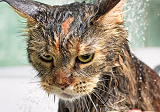A while back I picked up the word tankie. In the sense that I learned it, this has a pretty specific meaning that references the politics of the past. But perhaps it has some relevance today.
In 1956, there was an uprising in Hungary against Soviet rule. This initially looked like it was going well. But after a few weeks, the USSR sent in troops and tanks and crushed the rebellion.
In the West, the heavy-handed Soviet response disillusioned many people who had previously been supportive of the idea of communism. But some true believers—especially in Britain—supported the Soviet reaction out of ideological purity. These people were pejoratively referred to as tankies, for their support for the Russian tanks that were unleashed on the protestors.
 As I say, the word is old and seems specific to another time. But according to the SJWiki, tankie can have an expanded meaning:
As I say, the word is old and seems specific to another time. But according to the SJWiki, tankie can have an expanded meaning:
More broadly, the term may refer to any leftist who is perceived to support or defend authoritarian regimes on the basis that they are enemies of the United States. This can include regimes that are not and do not claim to be communist such as those of Vladimir Putin in Russia and Bashir al-Assad in Syria.
Of course, in this expanded definition, the word tank is no longer relevant. (Altho I suppose it might be with respect to the Tiananmen Square massacre.) The central idea is that anyone who's an enemy of the US might be worth supporting, no matter how bad their ideology or human-rights record.
Update (22 Oct 2019): Nancy Friedman notes that she covered tankie (with more detail) as one of her words of the week back in 2018. For more on this term, including its use to describe a dog coat, go read her blog entry.
While we contemplate how tankie might play out in today's world, let's turn to origins. In a discussion about cats today, the word dander came up. Though what actually happened was that the word dandruff came up to mean dander. Which made me wonder whether dandruff was related to dander and/or where the word came from.
So, to start, yes, dander and dandruff seem to be related. If you look up dander in the sense of the stuff that collects on cat fur, they refer you to dandruff. Is it perhaps surprising that dandruff is the older term? It was to me.
We've had it in English since the mid-1500s. And it's interesting to see that people have been looking for cures for at least that long—here's a suggestion recorded in 1601: "The iuice of Garlick..beeing taken in drinke cleanseth the head from dandruffe." The alternate term dander dates from the 1800s.
 Disappointingly, the etymology of dandruff is listed as "of unknown origin." Douglas Harper, who is not afraid to go where the OED fears to tread, suggests that the ruff part might be an old dialect term for "scab" and might have also been related to the Old English word for "leper." (He also includes the wonderful information that older English words for dandruff are bran, furfur, and scales.)
Disappointingly, the etymology of dandruff is listed as "of unknown origin." Douglas Harper, who is not afraid to go where the OED fears to tread, suggests that the ruff part might be an old dialect term for "scab" and might have also been related to the Old English word for "leper." (He also includes the wonderful information that older English words for dandruff are bran, furfur, and scales.)
You might wonder how the expression get your dander up figures into all this. This is an American expression that seems to be from the 19th century. It might refer to dander in the sense of dandruff/dander. Or it might be related to a now-obsolete sense of dander to mean "ferment," which might come from a Spanish verb redundar ("to overflow").
All in all, not an entirely satisfactory delve into word history. That just happens sometimes, oh well.
Like this? Read all the Friday words.
 |
|

 |
|
